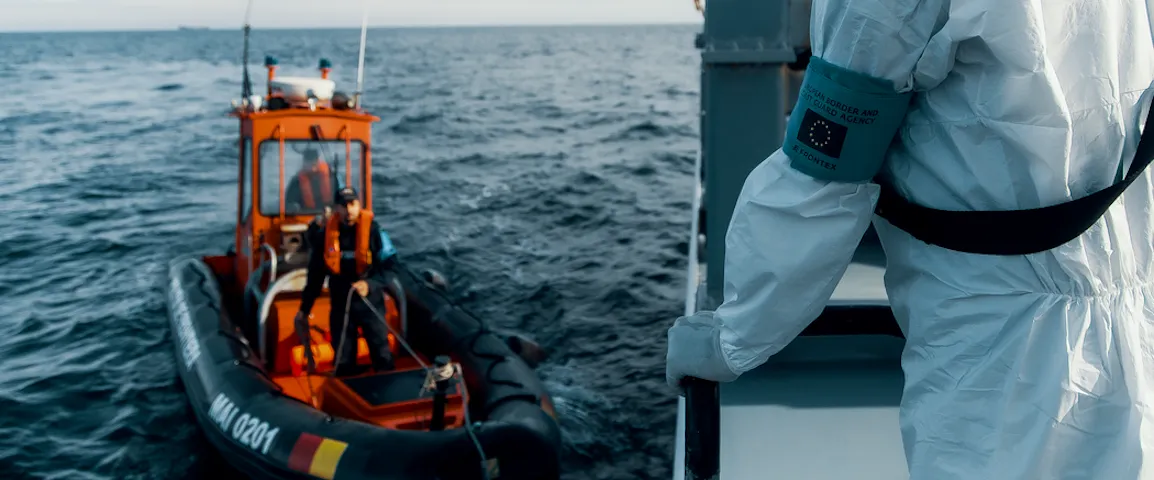Home > All About Frontex: Europe's Border and Coast Guard Agency

All About Frontex: Europe's Border and Coast Guard Agency
If you’ve heard of this organization and wondered, "What is Frontex EU, and why is it so important?", this article will give you all the information that you need to know.
Frontex, officially known as the European Border and Coast Guard Agency, plays a critical role in managing and safeguarding the external borders of the European Union (which includes 27 different countries), as well as Schengen borders.
With migration, security, and border management remaining hot topics in Europe and worldwide, for that matter, Frontex has increasingly stepped into the spotlight.
What is Frontex EU?
Frontex, also known as the European Border and Coast Guard Agency, is an EU agency responsible for coordinating border control and management between EU member states.
According to their website, they “support EU Member States and Schengen-associated countries in the management of the EU’s external borders and the fight against cross-border crime.“
Frontex was established in 2004, but as Europe continues to face migration challenges and security concerns, its role has significantly grown in the past few years. Because of this, Frontex collaborates with national border and coast guards, providing technical and operational support in areas like surveillance, risk assessment, and rapid border interventions.
Frontex is unique in that it's able to mobilize resources very quickly and on a large scale. It can deploy border guards from across the EU and facilitate joint operations with cutting-edge technologies, such as drones and biometric data, to monitor and secure Europe’s borders.
Frontex's purpose
Frontex’s main focus is to create a secure and well-managed border system for the European Union. This includes a wide range of functions that go beyond patrolling borders. Here are some of Frontex's main focuses:
- Border security and management: Frontex helps make sure that the EU’s external borders are secure from different threats like illegal crossings, human trafficking, smuggling, and terrorism. They monitor border crossings to ensure that people (and goods) entering the EU are subject to necessary checks and controls, which helps keep everyone safe.
- Migration management: The agency also plays an important role in managing migration flows. It helps make sure that the EU can accommodate migrants and asylum seekers safely and humanely while also deterring irregular migration. This includes deploying personnel to hotspots during migration crises and helping process asylum claims.
- Combatting cross-border crime: In addition to managing migration, Frontex supports efforts to combat cross-border crimes such as drug and human trafficking. They coordinate joint operations with EU member states to tackle criminal networks operating along Europe’s borders.
- Emergency interventions: Frontex has the authority (and ability) to rapidly deploy teams to assist any EU country experiencing urgent and overwhelming border issues. This has been particularly important during moments of heightened migration.
- Information sharing and research: Frontex has technology that allows them to provide valuable data and intelligence on border management, migration trends, and emerging threats. Their risk analyses are crucial in shaping EU policies related to border security and migration.
Within the realm of all of the different roles that they play, Frontex has a handful of tasks, including:
- Protecting borders
- Research and innovation
- Training
- International and EU cooperation
- Fighting cross-border crime
- Monitoring the borders
- Risk analysis

Their role in border protection
The EU’s external borders are the areas where EU countries meet non-EU countries. These borders include land, sea, and even air routes. Given how large the EU is, Frontex monitors borders that touch regions such as Eastern Europe (for example, Ukraine), the Western Balkans, North Africa, and the Middle East.
Key areas of focus for Frontex are:
- Land borders: These are the terrestrial borders between EU and non-EU nations, such as the borders between Poland and Ukraine or between Greece and Turkey.
- Maritime borders: Many of the EU’s southern members – like Italy, Greece, and Spain – face external borders across the Mediterranean and Aegean seas. These borders are critical in managing migration flows from Africa and the Middle East.
- Air borders: Frontex monitors air travel into the EU to prevent illegal entry, trafficking, or any other security threat through international flights.
Managing these borders is a complex task, involving not only EU member states but also cooperating with neighboring non-EU countries.
How Frontex is funded
As an EU agency, Frontex’s funding comes from the European Union's budget. In recent years, the EU has increased Frontex's budget to address growing migration and border security concerns.
Additionally, Frontex receives financial contributions from associated non-EU countries that cooperate with the agency, like Norway, Switzerland, and Iceland. These countries participate in specific operations or provide additional resources to support joint border management activities, even though they’re not members of the European Union. It’s truly a joint effort.
The increase in funding also supports Frontex’s plan to grow its standing corps, which is part of the EU’s broader strategy to strengthen border protection, especially with increasing pressures around migration and external security threats.
Why Frontex matters
Understanding Frontex is important for anyone interested in European politics, migration, and security. They play a pivotal role in shaping how the EU handles some of its most pressing challenges, from migration flows to preventing cross-border crime.
If you live in Europe or plan to travel there, you are directly affected by Frontex's work, whether you see it or not. This agency ensures that EU borders remain open to travelers and trade while protecting against criminal activity. It also helps keep Europe secure, preventing terrorism, trafficking, and smuggling – which benefits everybody.
In conclusion, Frontex is an integral player in ensuring that Europe’s borders are secure, effectively managed, and capable of responding to today's challenges. With its expanding resources and mission, Frontex is set to remain a vital part of the European Union's approach to border management and security in the years to come.
